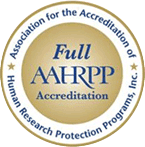Index
University of Iowa Purchases System to Facilitate Clinical Trials Management
NIH FORMS-G Changes to be Reflected on Human Subjects Clinical Trials Form
Medical Ethics Advisor Newsletter, January 2022
In the News
University of Iowa purchases system to facilitate clinical trials management
Six vendors were reviewed, interviewed and evaluated. Of those six, the three that had the most comprehensive systems were chosen to present to the research community. The research community provided feedback and Advarra OnCore was selected. We are pleased to announce that the University of Iowa has finalized a contract with Advarra OnCore.
We are in the beginning stages of implementing this enterprise CTMS that will help establish standard processes available to all clinical studies across the University of Iowa Healthcare. Processes supported by this CTMS include study planning (with budgets), financial tracking and management, study calendars, regulatory management, and data capture all in an environment that is 21 CFR Part 11 compliant.
A 9-month implementation process for this system will start in March 2022. If you would like to learn more about this new resource please contact Kristy Mahan, kristy-mahan@uiowa.edu .
NIH FORMS-G Changes to be Reflected on Human Subjects Clinical Trials Form (as of Feb 10)

This message is rebroadcast from an earlier February notification from the Research Administration Dispatch (RAD) from the Division of Sponsored Programs (DSP).

The Human Subjects Office is rebroadcasting a message from the DSP newsletter (RAD) as it contains important information regarding the grant submission process for human subject clinical trials. The message in its entirety is available.
This RAD article is located here
The RAD archive is located here
One of the updates will have implications for those researchers who are utilizing a single IRB (sIRB) plan. If a grant is proposing to have the University of Iowa IRB serve as the sIRB, please notify the Human Subjects Office when preparing to submit the grant application to discuss this arrangement by completing a sIRB PreGrant Survey. A member of our external IRB review team will follow up with the PI/contact for all submitted survey. Please be sure to submit the survey in advance to allow for sufficient time to evaluate the request. IRB fees will apply for this service and will be discussed as part of the pre grant survey review.
Medical Ethics Advisor Newsletter, January 2022
Rachel Kinker, MPA
Medical Ethics Advisor (a publication of Relias, LLC) is a monthly newsletter with articles about human subjects research and medical ethics. Current and past issues of Medical Ethics Advisor and IRB Advisor are posted in the “IRB ICON Course for Researchers.” The portal to this ICON Course is on the Education and Training page of the Human Subjects Office website. This month we are spotlighting some articles about human subjects research from the January 2022 Medical Ethics Advisor Newsletter.
New Data on IRB Members’ Perceptions of Violations
The two most common violations that researchers make are data storage and recordkeeping. Recommendations to prevent violations:
- Providing researchers with data archiving services
- Ethics and protection of human subjects training to researchers at all career stages
- Education regarding the consequences of violating protections
- Updating researchers on new policies and regulations
- When deviations occur, IRBs should submit reports outlining corrective and preventative actions (CAPA) to take place to prevent the deviations from reoccurring
Screening Tests to Determine Study Eligibility Are Not Foolproof
Screening tests to determine which participants to include and exclude are not foolproof. Many produce false-positives and false-negatives and can exclude participants or create bias. Researchers can improve screening and recruitment by eliminating unnecessary screening tests (particularly tests that produce false-positive or false-negative results), exploring potential alternative screening tests, expanding eligibility criteria to diversify representation and remove extraneous inclusion/exclusion criteria and, in some instances, not sharing the eligibility criteria in advance. Additionally, working with statisticians to determine the percentage of participants in a trial that were not actually eligible may be useful as well.
Single IRB Concerns Include IT Limitations, Process Variations
Single IRB review is required under Common Rule Guidelines and NIH policy.
- Benefits: consistency, standardization, speed, efficiency and simplification
- Challenges: Timeliness, insufficient communication and uncertainty at local institutions
- Issues when serving as a single IRB: IT issues; outside investigators gaining access, lack of interoperability across systems, legacy systems not designed with single IRBs in mind
- Tips for IRBs: IRBs that will serve as the single IRB for multisite studies should determine if their IT system is prepared for this role, is new/additional software needed, are there time and resources to train staff on the new system
Other articles in the January 2022 Issue:
- Excluding People with Serious Mental Illness from Research is Ethical Problem
- Patients Can Request Ethics Consults, But Almost None Do
- Informed Consent Challenges with High-Risk Surgery
- Researchers Can Remove Recruitment Barriers in Alzheimer’s Trials
- Notification Practices Vary for Emergency Research, Few Participants Withdraw
- Ethical Considerations When Nurses Perform ‘Slow Codes’ at End of Life
- Infections Complications Carry Ethical Implications for End-of-Life Care
- Medical Residents Know Little About Surrogate Decision-Making Laws
- Remote Consults Expand Reach of Ethics, But Complex Cases Remain Challenging
- Most PICU Clinicians Report Moral Distress During Covid-19 Pandemic

In the News, March 2022
- Social connectedness, sleep and physical activity associated with better mental health among youth during the COVID-19 pandemic (NIH News Releases)
- Myocarditis: COVID-19 is a much bigger risk to the heart than vaccination (The Conversation)
- The COVID-19 pandemic has inspired new health habits for these 4 scholars – here’s what they put into practice and why (The Conversation)
- Using the eye as a window into heart disease (ScienceDaily)
- Men prone to anxiety, worry may develop more risk factors for heart disease, stroke and diabetes (American Heart Association News)
- Why we feel confident about decisions we make (ScienceDaily)




